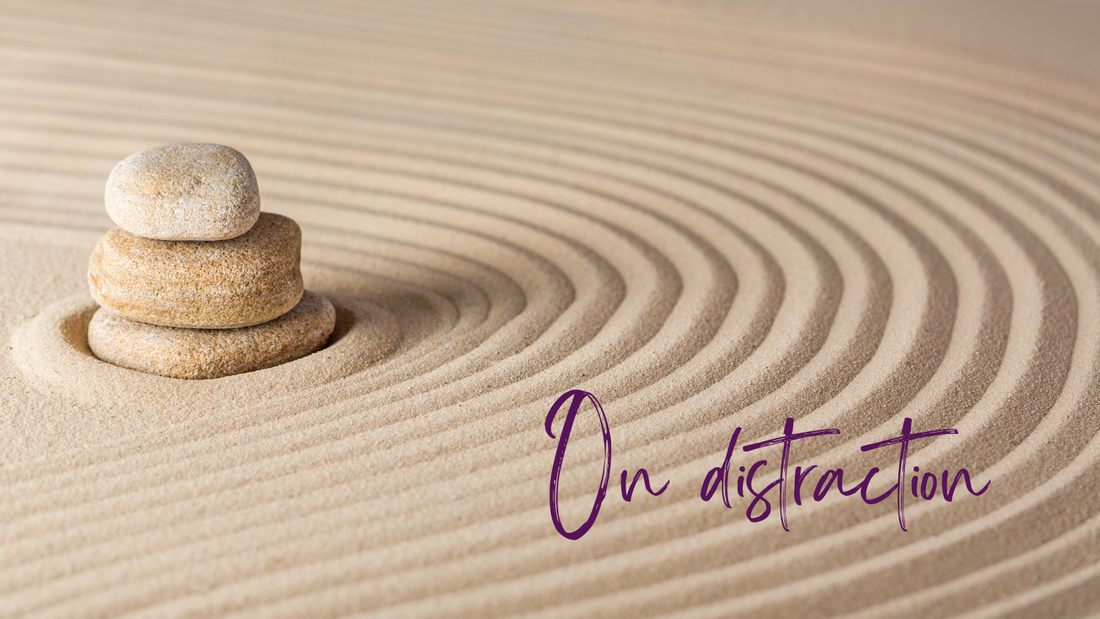No. 6 - On distraction
Share
As I write, my mind has already wandered a couple of times. I remembered the Rooibos Soother that I left steeping and got up to pour it. I switched over and changed the music playlist (funky white noise not being my jam). Got nosed by the dog for more ear scratches. Then my kids settled in beside me ... enough said. And perhaps it is only me, but it seems that the energy that spring brings - with the accelerated growth around us, fickle weather, and ramping up of activities after winter's relative restfulness - amplifies distractibility. If you have a superpower that allows you to be 'indistractible' I raise my teacup to you - I hope to see you soon and wish you the best as you go on with your day, superpower in tow. If, however, you are over here in Distractible Land with me, read on.
Serenity
Distraction is like a pebble in the shoe of tranquility. Imagine having just prepared your physical or mental space for meditation, work, creation, or simply existing in the moment, only for a pebble to appear. Initially, it may seem negligible, but over time, it demands your attention. Physical distractions are fairly easy to deal with - close the door, put in earphones, put on a sweater and return to your desired state. But many of us struggle more when distractions stem from thoughts. Again, you may have developed techniques to dislodge the metaphorical pebble; if not, consider exploring the ideas in an insightful interview with Naval Ravikant, referred to as "The Angel Philosopher", on the Knowledge Project Podcast (#171). Packed with intriguing concepts, one part of the discussion particularly resonates with the theme of managing distractions. He discusses acknowledging intrusive thoughts and reminding oneself that these do not require immediate resolution. By internally asking, "Do I really need to solve this problem right now?" he proposes that you can set aside the distraction, extending your state of clarity and focus. Rest assured, any truly pressing issues will resurface when the time is right for you to address them.
Perseverance
Finding an effective system to maintain focus can be a dynamic challenge; what works for you may change with the different seasons of your life. The strategies that were effective when you were a single young professional may look different from what fits now that you're balancing parenting pre-teens, volunteering for the swim club, and trouble-shooting the massive to-do list. It's natural to experience frustration when a previously successful approach no longer seems to work. Recognizing this increased friction is half the battle and invites curiosity about its origins. Taking a moment to sit with a cup of tea and gain some claritea - pun intended - on the source of this resistance and what currently meets your needs can be incredibly beneficial. Once you've identified these, you can adjust and move forward.
Well-being
The history of tea is steeped in story and rooted in well-being with tea leaves being mixed with spices for medicinal purposes as far back as the Han Dynasty (~202 BC - 220 AD). Today, we continue to learn about its health benefits including the presence of various polyphenols that may have disease preventive properties. And of course there is caffeine, which as long as you are not sleep deprived and you can metabolize it, can give the brain a little perk up and help with focus. But if caffeine is not your thing, explore and find what energizes you. Maybe some warming cinnamon or something tart like hibiscus, or maybe a little grounding Rooibos. Let your body be your guide.
One more thing...
“The shorter way to do many things is to only do one thing at a time.” – Mozart
Until next time,
Steep Calm.
Bree

